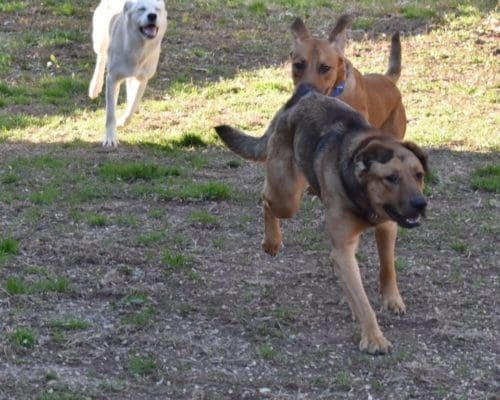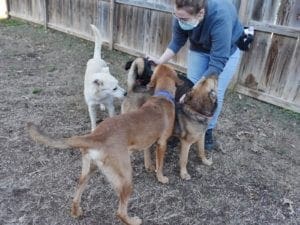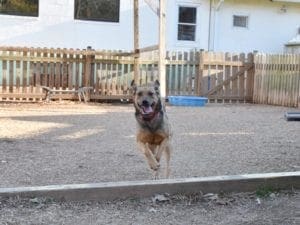Homeward Trails Animal Rescue
Washington, D.C.-based Homeward Trails Animal Rescue (HT) founder Sue Bell told The Canine Review she got the idea to start HT after a New Year’s Eve trip gone wrong.
Bell recalled vacationing with friends at a cabin in Fayette County, West Virginia in December 2001. After spotting an animal shelter down the road from their rental, Bell says she decided to donate some items she had picked up from the grocery store. While dropping off the donations and chatting with the shelter staff, Bell says she learned that the shelter had been hit by a flash flood earlier that year and that almost 50 animals had drowned in their cages.
“[It] was horrifying to hear, so that kind of ruined my vacation,” Bell told TCR in November 2020. “But on New Year’s Day, I … decided I would if they would let me, rescue three dogs and get them back to the D.C. area and just find homes for them.”
Bell says she ran an advertisement in The Washington Post to seek out potential adopters. Within a week, she says, she found homes for all three dogs – and interest from even more people.
“My phone just blew up over the next 10 days with people saying, ‘Oh, we’re looking for a dog and we can’t find one at our local shelter. Can you help us?’” Bell said. “The obvious light bulb went on.”
After weeks of making the six-hour drive each weekend to West Virginia to rescue dogs for D.C. adopters, Homeward Trails was born.
Homeward Trails has a shelter facility in Fairfax County, Virginia, and almost 1,000 foster homes. The organization reported about $1.9 million in revenue in 2019, of which about $70,000 was remaining after more than $1.8 million in operating expenses, according to the most recent available Tax Form 990 filed in 2019.
The organization reported 42 total employees in the 2019 calendar year.
At any given time, Homeward Trails has an average of 60 dogs at its shelter facility and 100 dogs in foster care, Bell said. The organization also rescues cats. In the last three years, according to Bell, Homeward Trails has found homes for an average of 3,117 animals per year.
Intake
In addition to receiving animals from the shelter in West Virginia, Homeward Trails gets its animals from about 20 shelters in the Mid-Atlantic and the southeastern United States.
“Most of [our partner shelters] are in Virginia because we’re based in Virginia, so we want to make sure that our own state is well on its way to being in a good place,” Bell said.
Homeward Trails also runs a program in Puerto Rico and has worked with rescue organizations in Thailand, Kuwait, Russia, Peru, and South Korea. Most dogs rescued through international partners are transported to the D.C. region to find homes, Bell said.
All of the dogs taken in are evaluated by the organization’s adoption center staff, which includes a behavioral team. Homeward Trails’ director of behavior is a certified professional dog trainer, Bell said.
The length of stay for dogs in the shelter or foster care varies, but averages 23 days, Bell said.
The Facility
The Homeward Trails adoption center is located at 11116 Fairfax Station Road in Fairfax County, Virginia, about 30 minutes outside of Washington D.C. Located on a residential side street, the facility looks a lot like a house from the exterior.
The dogs are kept in crates and taken out multiple times a day to socialize in playgroups, according to Adoption Center Director Mark Goodhart, who met TCR for a tour of the adoption center in November. Goodhart requested that the dogs not be photographed in their cages. TCR observed clean crates that appeared to be appropriately sized for the dogs they held.
Due to COVID-19 restrictions, the adoption center is currently open by appointment only. For more information or to schedule an appointment, contact adoptioncenter@homewardtrails.org. Prior to the pandemic, the facility had public visiting hours on weekends.
Adoption Process
Those who wish to adopt from Homeward Trails must undergo an adoption process involving reference checks and interviews. However, the process can move quickly, and same-day adoptions can occur.
All dogs that are available for adoption are listed on the Homeward Trails website. Potential adopters can either apply for a specific dog by emailing the adoption coordinator listed or they can schedule an appointment to visit available dogs at the adoption center. The application process includes an online questionnaire as well as a telephone interview with an adoption coordinator.
Applicants are also required to provide contact information for their landlord if they are renting and for their veterinarian, if they currently or previously owned another pet.
If all goes well with the reference checks, interviews, and meeting the dog, the applicant can adopt the dog. If there are multiple applicants for the same dog, the process is first-come, first-served, according to Bell.
Adopters must sign an adoption agreement pledging to spay or neuter their dog if it isn’t spayed or neutered already and to return the dog to Homeward Trails if the adoption doesn’t work out for any reason, Bell added.
Pre- and Post-Adoption Services
All dogs are fully vaccinated, micro-chipped, and tested for heartworm by the time they are available for adoption. If a dog is heartworm positive, Homeward Trails will cover the cost of treatment.
Dogs older than four months are spayed or neutered prior to adoption. Adopters must provide Homeward Trails with proof that their dog has been spayed or neutered if the dog is adopted before it reaches four months.
Homeward Trails offers adopters other perks, according to Bell, including a free training consultation with a local business, a free veterinary wellness exam, and a month of free pet insurance.
Finances
The organization has two primary revenue sources: donations and adoption fees, each providing about 50%, Bell said. The adoption fee varies by each dog but is $475 on average. Fees have been waived for some dogs.
The organization’s single largest revenue source is revenue generated from calendars it produces in partnership with the Washington Capitals hockey team. Every year, Homeward Trails partners with the team to sell the Caps Canine Calendar, a calendar featuring photos of Caps players with dogs from Homeward Trails. The calendars generate between $125,000 and $175,000 per year.
Homeward Trails publishes its 990 tax forms and outcome data, including historical data, on its website. Outcome shelter data, which includes the number of animals euthanized, can be controversial which is why some shelters elect not to publish.
Outcome data
For the last six years, the organization has reported a 99.9% live release rate, according to its website.
- Yes







